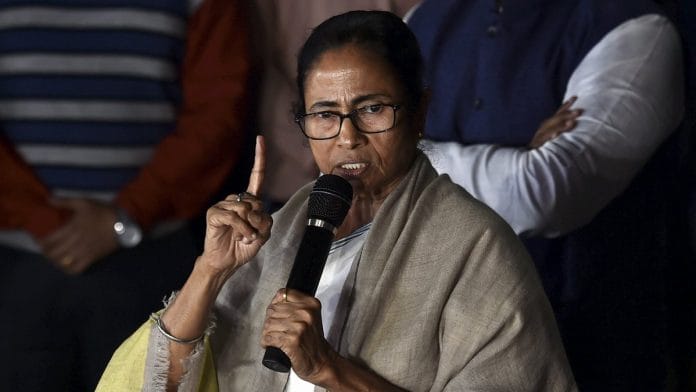Trust West Bengal Chief Minister Mamata Banerjee to think out of the box.
Everyone expected her counterpunch to the public outrage and political flak over the ghastly rape and murder of a trainee doctor in Kolkata to land with all the ingenuity at her command. But no one could have anticipated that she would completely blank out her government’s lapses in running hospitals and her administration’s flawed response to the crime, and instead, write to Prime Minister Narendra Modi, demanding immediate action to stop the spate of rapes and murders in the country. The stenography: rapes and murders don’t just happen in West Bengal.
Is this a political strategy? Or is it a sign of her desperation to claw out of the mess she is in?
The junior doctors on cease-work at hospitals across West Bengal today are painting RG Kar Medical College and Hospital’s former principal Dr Sandip Ghosh as the villain. He is now likely to undergo a lie detector test. They squarely blame the state for their colleague’s death.
Loopholes in safety systems
Much has already been said about the infrastructure deficits at the hospitals: no toilets for women doctors on long shifts, no place for them to rest, and sometimes they are forced to share a room with male doctors for a quick nap. At the chest medicine department of the RG Kar Medical College and Hospital, where the crime took place, junior doctors took turns resting in the polysomnography room—a sleep disorder testing room with two beds that isn’t used every night.
There is a police post at the hospital, which includes civic volunteers – one of whom has been arrested for the crime. But the visible security on campus is men and women in blue, their shirts monogrammed with the letters ‘ERS’. I asked a frail old man in that uniform what ERS stood for. “Ex-Servicemen’s Resettlement Society,” he said. “Oh, so you are ex-Army,” I asked. “No none of us are,” he replied. I didn’t have the heart to ask what kind of training they received or what their wage was.
But there is more to safety for doctors, especially women doctors, than just brick-and-mortar or CISF personnel currently patrolling the hospital.
The National Task Force appointed by the Supreme Court could begin its investigations into the loopholes and lacunae in safety systems by listing how many government-run medical colleges and hospitals in the country have Internal Complaints Committees (ICC), which are mandatory in all institutions since the Sexual Harassment of Women at the Workplace (Prevention, Prohibition and Redressal) Act 2013 came into force.
Dozens of junior women doctors I spoke to over the last fortnight during protest rallies and candlelight vigils had no idea if there was an ICC in their college. A women’s rights activist friend found the full details of 14 committee members on the official website of the RG Kar Hospital. The only problem is that the first name on the list was that of the former principal now under investigation.
It’s a complete violation of the POSH Act, the activist said—a mockery of the committee. The head of an institution cannot, by law, be a member of its sexual harassment committee. No wonder the junior doctors did not know it even existed. The committee is not just where women can complain about sexual assault; it’s also for any gender-based discrimination. Its dysfunction at the hospital reflects the patriarchy within.
Also read: Teacher’s FB post ignited mass movement over Kolkata rape-murder. Inside war room keeping it alive
Back to the Middle Ages
Patriarchy spills out of CM Banerjee’s solution to crimes against women: Her government will now set up Rattirer Sathi or ‘Helpers of the Night’. Women’s volunteer force will be created and deployed at night in all government hospitals, medical colleges, hostels and other places where women work night shifts. I wonder if they will also be deployed at police stations with policewomen on duty after sunset. Or does night begin at 9 pm?
There are other gems: women will do night duty in pairs, working hours for women, including doctors, should not exceed 12 hours at a time, and finally, “wherever possible, night duty may be avoided for women to the extent possible”.
Feminists are dismissing this intervention as beneath comment, struck by the irony that it comes from a government led by a woman advocating a return to the Middle Ages.
As it is, numbers are skewed against women doctors in India. Studies show that they outnumber men in medical colleges across the country, occupying more than 50 per cent of seats.
But when it comes to working in the big bad world outside, only 14.2 per cent of doctors in India are women, as per 2004 WHO data.
You know why. Marriage, motherhood and who will run the house. Not even the lure of a lucrative career can compete with ingrained patriarchy. Beti padhao lekin naukri? Kabhi nahin!
The trainee doctor killed at the RG Kar Hospital was on a cusp: she had an MBBS and was in the middle of getting her PG degree in respiratory and pulmonary diseases, from lung cancer to tuberculosis. But that was not to be. Her big dreams were brutally cut short.
We want justice, women are crying on the streets. For others, her death is either a political headache to deal with or a political opportunity to make the most of.
Monideepa Banerjie is a senior journalist based in Kolkata. She tweets @Monideepa62. Views are personal.
(Edited by Ratan Priya)







Sagarika Ghose is still silent on Kolkata incident, she can atleast write anti-Modi articles.